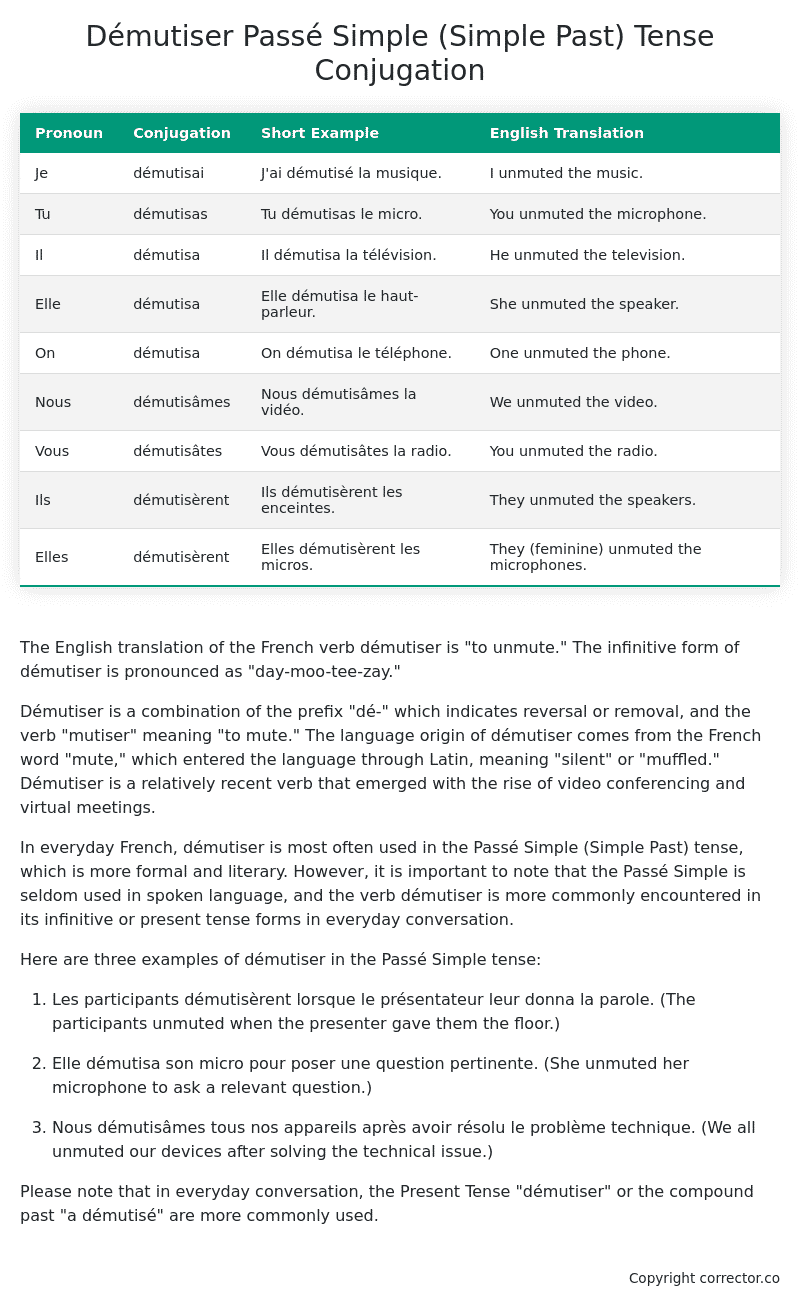Passé Simple (Simple Past) Tense Conjugation of the French Verb démutiser
Introduction to the verb démutiser
The English translation of the French verb démutiser is “to unmute.” The infinitive form of démutiser is pronounced as “day-moo-tee-zay.”
Démutiser is a combination of the prefix “dé-” which indicates reversal or removal, and the verb “mutiser” meaning “to mute.” The language origin of démutiser comes from the French word “mute,” which entered the language through Latin, meaning “silent” or “muffled.” Démutiser is a relatively recent verb that emerged with the rise of video conferencing and virtual meetings.
In everyday French, démutiser is most often used in the Passé Simple (Simple Past) tense, which is more formal and literary. However, it is important to note that the Passé Simple is seldom used in spoken language, and the verb démutiser is more commonly encountered in its infinitive or present tense forms in everyday conversation.
Here are three examples of démutiser in the Passé Simple tense:
-
Les participants démutisèrent lorsque le présentateur leur donna la parole.
(The participants unmuted when the presenter gave them the floor.) -
Elle démutisa son micro pour poser une question pertinente.
(She unmuted her microphone to ask a relevant question.) -
Nous démutisâmes tous nos appareils après avoir résolu le problème technique.
(We all unmuted our devices after solving the technical issue.)
Please note that in everyday conversation, the Present Tense “démutiser” or the compound past “a démutisé” are more commonly used.
Table of the Passé Simple (Simple Past) Tense Conjugation of démutiser
| Pronoun | Conjugation | Short Example | English Translation |
|---|---|---|---|
| Je | démutisai | J’ai démutisé la musique. | I unmuted the music. |
| Tu | démutisas | Tu démutisas le micro. | You unmuted the microphone. |
| Il | démutisa | Il démutisa la télévision. | He unmuted the television. |
| Elle | démutisa | Elle démutisa le haut-parleur. | She unmuted the speaker. |
| On | démutisa | On démutisa le téléphone. | One unmuted the phone. |
| Nous | démutisâmes | Nous démutisâmes la vidéo. | We unmuted the video. |
| Vous | démutisâtes | Vous démutisâtes la radio. | You unmuted the radio. |
| Ils | démutisèrent | Ils démutisèrent les enceintes. | They unmuted the speakers. |
| Elles | démutisèrent | Elles démutisèrent les micros. | They (feminine) unmuted the microphones. |
Other Conjugations for Démutiser.
Le Present (Present Tense) Conjugation of the French Verb démutiser
Imparfait (Imperfect) Tense Conjugation of the French Verb démutiser
Passé Simple (Simple Past) Tense Conjugation of the French Verb démutiser (You’re reading it right now!)
Passé Composé (Present Perfect) Tense Conjugation of the French Verb démutiser
Futur Simple (Simple Future) Tense Conjugation of the French Verb démutiser
Futur Proche (Near Future) Tense Conjugation of the French Verb démutiser
Plus-que-parfait (Pluperfect) Tense Conjugation of the French Verb démutiser
Passé Antérieur (Past Anterior) Tense Conjugation of the French Verb démutiser
Futur Antérieur (Future Anterior) Tense Conjugation of the French Verb démutiser
Subjonctif Présent (Subjunctive Present) Tense Conjugation of the French Verb démutiser
Subjonctif Passé (Subjunctive Past) Tense Conjugation of the French Verb démutiser
Subjonctif Imparfait (Subjunctive Imperfect) Tense Conjugation of the French Verb démutiser
Subjonctif Plus-que-parfait (Subjunctive Pluperfect) Tense Conjugation of the French Verb démutiser
Conditionnel Présent (Conditional Present) Tense Conjugation of the French Verb démutiser
Conditionnel Passé (Conditional Past) Tense Conjugation of the French Verb démutiser
Conditionnel Passé II (Conditional Past II) Tense Conjugation of the French Verb démutiser
L’impératif Présent (Imperative Present) Tense Conjugation of the French Verb démutiser
L’impératif Passé (Imperative Past) Tense Conjugation of the French Verb démutiser
L’infinitif Présent (Infinitive Present) Tense Conjugation of the French Verb démutiser
L’infinitif Passé (Infinitive Past) Tense Conjugation of the French Verb démutiser
Le Participe Présent (Present Participle) Tense Conjugation of the French Verb démutiser
Le Participe Passé (Past Participle) Tense Conjugation of the French Verb démutiser
Struggling with French verbs or the language in general? Why not use our free French Grammar Checker – no registration required!
Get a FREE Download Study Sheet of this Conjugation 🔥
Simply right click the image below, click “save image” and get your free reference for the démutiser Passé Simple tense conjugation!

Démutiser – About the French Passé Simple (Simple Past) Tense
Formation
Usage
Narration
Historical Context
Interactions with other tenses
Passé Composé
Imparfait
Conditional and Subjunctive
Summary
I hope you enjoyed this article on the verb démutiser. Still in a learning mood? Check out another TOTALLY random French verb conjugation!


